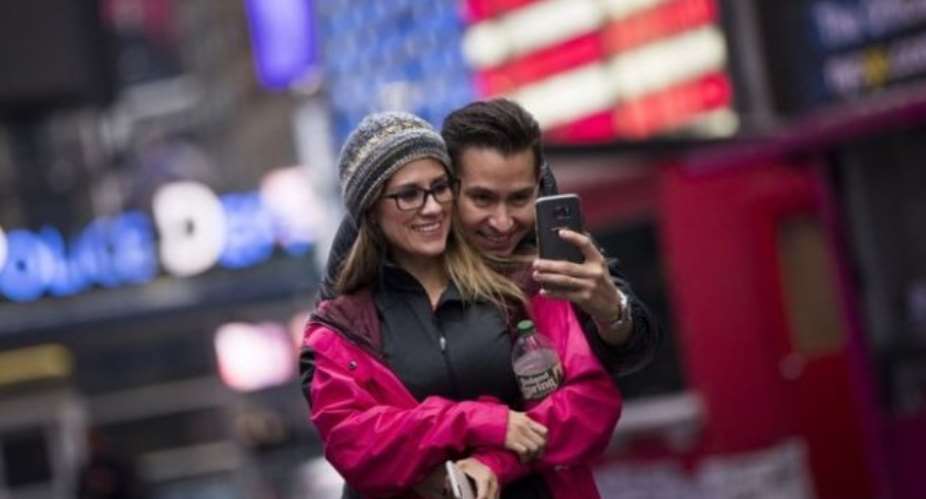Travel to the US is falling, a decline some in the tourism industry blame on US President Donald Trump.
The number of international visitors fell by 4% in the first seven months of 2017, according to the US National Travel & Tourism Office.
The trend occurred across all regions, with Africa and the Middle East reporting some of the most dramatic declines.
The decrease in the US contrasts with rising tourism globally.
Some have dubbed the fall in the US a "Trump slump", pointing to the president's America First rhetoric and anti-immigrant comments, as well as tighter visa rules for some countries and other restrictions.
The fall is not uniform.
Visitors from Canada - typically the source of the greatest number of foreign travellers - increased by 4.6% year-on-year through July, according to the US.
But visits from the next two major tourist markets - Mexico and the UK - slipped in the period.
Travel from China, which accounted for the fifth highest number of visitors, also fell, while it held steady in Japan, the number four market.
Why is this happening?
In the important UK market, a weaker pound is likely dissuading visitors, said David Tarsh, a spokesman for ForwardKeys, a Spain-based company that analyses travel patterns.
But broadly speaking, the dollar's value has fallen sharply this year, making it cheaper for most foreigners to travel in the US than it was in 2016.
Though the dollar remains relatively strong compared to five years ago, Mr Wolfington said he thinks sentiment is the driving factor, as global surveys show approval of US leadership has fallen.
He said US tourism suffered similarly after the attacks on the World Trade Center in 2001, when the US emphasised border security and launched the unpopular invasion of Iraq.
"Non-US citizens got the impression they were not welcome in the US," said Mr Wolfington, who identifies as a political independent. "Today we're facing the same situation."
Mr Tarsh said ForwardKeys has not been able to isolate the impact of the president's policies and rhetoric. But the firm expects long-haul bookings to the US to continue to lag the rest of the world in 2018.
"We can't say that it is causative, but at the same time we can't see how it could be helpful," he said.
How does this compare globally?
The decline in foreign travellers makes the US an outlier.
International tourist arrivals increased by 7% last year, led by gains in Europe, the United Nations reported recently.
The report, based on preliminary figures, said Spain is on track to replace the US as the number two travel destination, after France.
Between 2015 and 2017, just two of the top 12 global destinations - the US and Turkey - experienced declines in long-haul travel, according to the Visit US coalition, a collection of travel industry groups that are drawing attention to the fall.
The coalition is casting its proposals as an economic imperative for the US.
"Our guiding principle is that we can have strong national security and still welcome legitimate international visitors," Roger Dow, president of the US Travel Association, said in a statement, which called the decline "troubling".
Spending by international visitors has fallen 3.2% - or by more than $250m- in the first 10 months of 2017, according to the Commerce Department.
The World Travel and Tourism Council says tourism contributed about 8% to gross domestic product in 2016.





 Meta releases new version of conversational AI across its platforms
Meta releases new version of conversational AI across its platforms
 Cape Town named Africa’s Best Airport 2024 by Skytrax
Cape Town named Africa’s Best Airport 2024 by Skytrax
 Bono East: Four injured after hearse transporting corpse crashes into a truck
Bono East: Four injured after hearse transporting corpse crashes into a truck
 ‘Be courageous, find your voice to defend our democracy’ — Sam Jonah urges journ...
‘Be courageous, find your voice to defend our democracy’ — Sam Jonah urges journ...
 Exodus of doctors, nurses and teachers have worsened because of unserious Akufo-...
Exodus of doctors, nurses and teachers have worsened because of unserious Akufo-...
 2024 election: Avoid insults, cutting down people in search of power – National ...
2024 election: Avoid insults, cutting down people in search of power – National ...
 ‘You passed through the back door but congratulations’ — Atubiga on Prof Jane Na...
‘You passed through the back door but congratulations’ — Atubiga on Prof Jane Na...
 Government’s $21.1 billion added to the stock of public debt has been spent judi...
Government’s $21.1 billion added to the stock of public debt has been spent judi...
 Akufo-Addo will soon relocate Mahama’s Ridge Hospital to Kumasi for recommission...
Akufo-Addo will soon relocate Mahama’s Ridge Hospital to Kumasi for recommission...
 We must not compromise on our defence of national interest; this is the time to ...
We must not compromise on our defence of national interest; this is the time to ...
